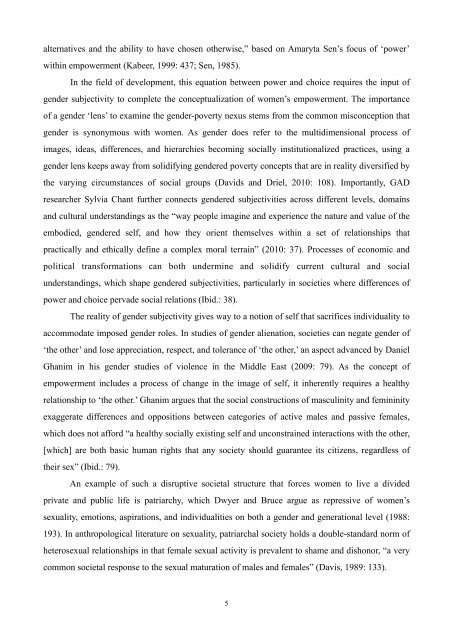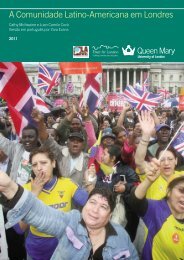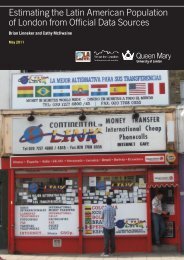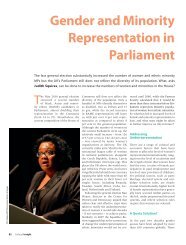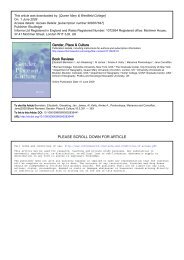Women's Empowerment and the Feminization of Poverty among
Women's Empowerment and the Feminization of Poverty among
Women's Empowerment and the Feminization of Poverty among
- No tags were found...
Create successful ePaper yourself
Turn your PDF publications into a flip-book with our unique Google optimized e-Paper software.
alternatives <strong>and</strong> <strong>the</strong> ability to have chosen o<strong>the</strong>rwise,” based on Amaryta Sen’s focus <strong>of</strong> ‘power’within empowerment (Kabeer, 1999: 437; Sen, 1985).In <strong>the</strong> field <strong>of</strong> development, this equation between power <strong>and</strong> choice requires <strong>the</strong> input <strong>of</strong>gender subjectivity to complete <strong>the</strong> conceptualization <strong>of</strong> women’s empowerment. The importance<strong>of</strong> a gender ‘lens’ to examine <strong>the</strong> gender-poverty nexus stems from <strong>the</strong> common misconception thatgender is synonymous with women. As gender does refer to <strong>the</strong> multidimensional process <strong>of</strong>images, ideas, differences, <strong>and</strong> hierarchies becoming socially institutionalized practices, using agender lens keeps away from solidifying gendered poverty concepts that are in reality diversified by<strong>the</strong> varying circumstances <strong>of</strong> social groups (Davids <strong>and</strong> Driel, 2010: 108). Importantly, GADresearcher Sylvia Chant fur<strong>the</strong>r connects gendered subjectivities across different levels, domains<strong>and</strong> cultural underst<strong>and</strong>ings as <strong>the</strong> “way people imagine <strong>and</strong> experience <strong>the</strong> nature <strong>and</strong> value <strong>of</strong> <strong>the</strong>embodied, gendered self, <strong>and</strong> how <strong>the</strong>y orient <strong>the</strong>mselves within a set <strong>of</strong> relationships thatpractically <strong>and</strong> ethically define a complex moral terrain” (2010: 37). Processes <strong>of</strong> economic <strong>and</strong>political transformations can both undermine <strong>and</strong> solidify current cultural <strong>and</strong> socialunderst<strong>and</strong>ings, which shape gendered subjectivities, particularly in societies where differences <strong>of</strong>power <strong>and</strong> choice pervade social relations (Ibid.: 38).The reality <strong>of</strong> gender subjectivity gives way to a notion <strong>of</strong> self that sacrifices individuality toaccommodate imposed gender roles. In studies <strong>of</strong> gender alienation, societies can negate gender <strong>of</strong>‘<strong>the</strong> o<strong>the</strong>r’ <strong>and</strong> lose appreciation, respect, <strong>and</strong> tolerance <strong>of</strong> ‘<strong>the</strong> o<strong>the</strong>r,’ an aspect advanced by DanielGhanim in his gender studies <strong>of</strong> violence in <strong>the</strong> Middle East (2009: 79). As <strong>the</strong> concept <strong>of</strong>empowerment includes a process <strong>of</strong> change in <strong>the</strong> image <strong>of</strong> self, it inherently requires a healthyrelationship to ‘<strong>the</strong> o<strong>the</strong>r.’ Ghanim argues that <strong>the</strong> social constructions <strong>of</strong> masculinity <strong>and</strong> femininityexaggerate differences <strong>and</strong> oppositions between categories <strong>of</strong> active males <strong>and</strong> passive females,which does not afford “a healthy socially existing self <strong>and</strong> unconstrained interactions with <strong>the</strong> o<strong>the</strong>r,[which] are both basic human rights that any society should guarantee its citizens, regardless <strong>of</strong><strong>the</strong>ir sex” (Ibid.: 79).An example <strong>of</strong> such a disruptive societal structure that forces women to live a dividedprivate <strong>and</strong> public life is patriarchy, which Dwyer <strong>and</strong> Bruce argue as repressive <strong>of</strong> women’ssexuality, emotions, aspirations, <strong>and</strong> individualities on both a gender <strong>and</strong> generational level (1988:193). In anthropological literature on sexuality, patriarchal society holds a double-st<strong>and</strong>ard norm <strong>of</strong>heterosexual relationships in that female sexual activity is prevalent to shame <strong>and</strong> dishonor, “a verycommon societal response to <strong>the</strong> sexual maturation <strong>of</strong> males <strong>and</strong> females” (Davis, 1989: 133).5


